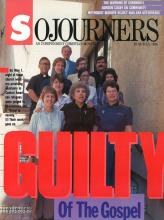PHILIP WILLIS-CONGER is former director of the Tucson Ecumenical Council's Task Force on Central American refugees. At the time of the interview, he was a United Methodist and he and his wife, Ellen, planned to enter the Pacific School of Religion and the San Francisco Theological Seminary, respectively, as soon as legal proceedings allowed. —The Editors
Sojourners: How have you felt about the trial? What have been your impressions?
Philip Willis-Conger: They've run the gamut. In good times I really appreciate all the learning I am doing during this process. But there have been a few really bad times in which I've felt like I have to get out, to escape.
What has impressed me about the trial itself is what a farce it has been. There doesn't seem to be any semblance of impartiality on the part of the judge. But that has developed a climate here in Tucson where there's a general feeling or awareness that the judge is biased, so that people who weren't interested in sanctuary, or were even against it, have become concerned that we're not getting a fair trial. And that has raised their consciousness level.
It's been a real shame that during the course of the trial we have not really dealt with the major issue. The basic issue isn't how our lawyers interact with the judge, or what Jesus Cruz, the informant, says on the stand. The issue is: Who are these people who are fleeing Central America? Are they persecuted? Do they have a right to asylum here? Is the Immigration and Naturalization Service (INS) breaking the law by not allowing them to apply for asylum at the border? Do church people have the right to respond affirmatively when their government breaks its own laws? These are some of the more central questions.
Read the Full Article
